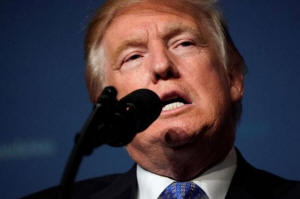|
White House says Trump opposes Senate's
bipartisan Obamacare deal
 Send a link to a friend
Send a link to a friend
 [October 19, 2017]
By Yasmeen Abutaleb and Amanda Becker [October 19, 2017]
By Yasmeen Abutaleb and Amanda Becker
WASHINGTON (Reuters) - A bipartisan deal
from two senators to stabilize Obamacare by restoring subsidies to
health insurers suffered major setbacks on Wednesday with the White
House saying President Donald Trump now opposes it and senior
Republicans speaking out against it.
House of Representatives Speaker Paul Ryan, Senate Finance Committee
Chairman Orrin Hatch, Senate Republican leadership member John Thune and
others expressed hostility to the deal announced on Tuesday by
Republican Lamar Alexander and Democrat Patty Murray. It was uncertain
if it would ever come to a vote in a Congress controlled by Trump's
fellow Republicans.
The agreement would shore up Obamacare by reviving billions of dollars
of federal subsidies to insurers for two years to help lower-income
Americans obtain medical coverage.
Alexander said on Wednesday that Trump had "completely engineered" the
bipartisan proposal, but the president backed away from support he had
expressed a day earlier.

On Tuesday, Trump said the White House was involved in the negotiations
and that the agreement was "a very good solution" for a short-term
approach, but said on Wednesday he could "never support bailing out"
insurance companies.
Trump has cut off subsidies to the companies, saying Congress has not
provided money for them and that they enrich insurers.
White House spokeswoman Sarah Sanders said Trump did not support the
deal in its current form, although she called it "a good step in the
right direction."
"Look, we've said all along that we want something that doesn't just
bail out the insurance companies but actually provides relief for all
Americans," she said at a briefing. "And this bill doesn't address that
fact."
BILL'S FATE AN 'OPEN QUESTION'
The confusion among lawmakers in both parties over Trump's position on
the healthcare deal and the lack of trust some of them have in the
president come as Congress is entering a crucial period when important
bills on federal spending, the U.S. debt limit and tax cuts are due for
consideration.
Thune said the agreement might have "stalled out" and that its future
was an "open question." Republicans have a 52-48 Senate majority, but
other than Alexander only a few have publicly embraced the plan,
including Senators John McCain, Susan Collins, Lisa Murkowski, Mike
Rounds and Bob Corker.
"No way to pay for it," Hatch said. "Oh my gosh, give me a break. I
appreciate the innovation and the attempt to do it right. But it doesn't
help."
Trump, who campaigned on a promise to get rid of Obamacare but has been
frustrated by the failure of Republicans in Congress to pass legislation
to do so, also made clear he wanted broader legislation to repeal and
replace the law.

"Lamar Alexander's working on it very hard from our side. And if
something can happen, that's fine," Trump told reporters at the White
House. "But I won't do anything to enrich the insurance companies. ...
They've been enriched by Obamacare like nothing anybody's ever seen
before."
Insurers say they do not profit from the subsidies under the Affordable
Care Act, former Democratic President Barack Obama's signature
legislative achievement dubbed Obamacare, but pass them on directly to
consumers to reduce deductibles, co-payments and other out-of-pocket
medical expenses for low-income people.
[to top of second column] |

President Donald Trump speaks to the Heritage Foundationís
Presidentís Club Meeting in Washington, U.S., October 17, 2017.
REUTERS/Joshua Roberts

Ending the subsidies, which are called cost-sharing reduction
payments, could create chaos in the 2018 health insurance markets
set up under Obamacare.
Some leading insurers, including UnitedHealth Group, Aetna Inc and
Humana Inc, have largely exited those markets, citing financial
losses. Others including Anthem Inc have significantly reduced their
presence in the state-based markets.
Ryan gave no indication of willingness to consider the
Alexander-Murray agreement. "The speaker does not see anything that
changes his view that the Senate should keep its focus on repeal and
replace of Obamacare," Ryan spokesman Doug Andres said.
'HOW HIGH?'
The proposal drew broad Democratic support. Top Senate Democrat
Chuck Schumer ripped Trump for his shifting stances on the
Alexander-Murray deal.
"This president cannot govern if, whenever the hard right frightens
him and says: 'Jump,' he says: "How high?'" Schumer told reporters.
"The president is pointing fingers," Schumer said. "He blames
(Senate Majority Leader) Mitch McConnell for obstruction. He blames
the Democrats for obstruction. He's the obstructionist in chief
because he cannot stick to a position."
The proposal would meet some Democratic objectives, such as reviving
subsidies for Obamacare and restoring $106 million in funding for a
federal program that helps people enroll in insurance plans.

In exchange, Republicans would get more flexibility for states to
offer a wider variety of health insurance plans while maintaining
the requirement that sick and healthy people be charged the same
rates for coverage.
Democratic attorneys general from 18 states and the District of
Columbia who have filed a legal challenge to the subsidy cutoff
asked a judge in California to direct the administration by Thursday
to continue the payments. At a hearing on Wednesday, U.S. District
Judge Vince Chhabria in San Francisco said he would likely rule on
the states' request next week.
Murray, speaking to Reuters on Wednesday, said her agreement with
Alexander was still very much alive.
"Absolutely," Murray said. "Lamar and I are working to have a good
set of co-sponsors," and hope to formally introduce it as a Senate
bill on Thursday.
(Reporting by Yasmeen Abutaleb and Amanda Becker; Additional
reporting by Ricard Cowan, Lawrence Hurley, Jeff Mason, Makini
Brice, Susan Heavey and Roberta Rampton in Washington and Dan Levine
in San Francisco; Writing by Will Dunham; Editing by Bill Trott and
Peter Cooney)
[© 2017 Thomson Reuters. All rights
reserved.]
Copyright 2017 Reuters. All rights reserved. This material may not be published,
broadcast, rewritten or redistributed.
 |